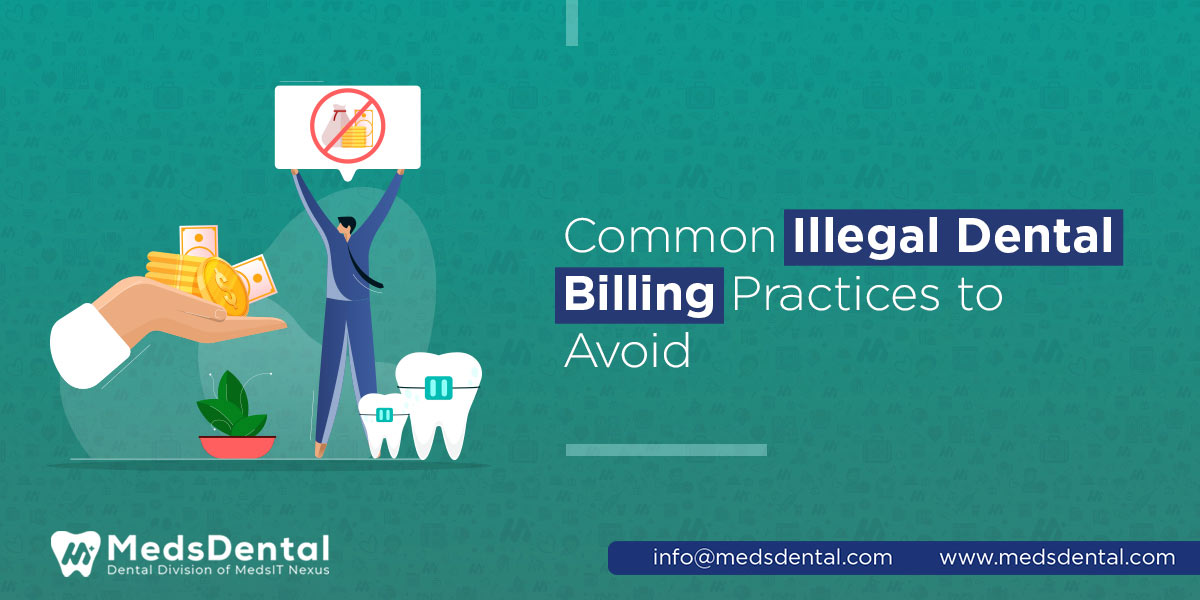

In the healthcare sector, dental practices are equally prone to the challenges of billing inaccuracies and fraudulent activities as other specialties. Illegal dental billing practices can lead to serious complications ranging from financial penalties to damaged reputations and even as severe as criminal charges. Taking measures well in time to understand the nature of these malpractices and avoiding them is essential for maintaining the integrity of your practice. The dentist and their staff must be vigilant and address all potential issues and concerns proactively. In this article, we will tell you about some of the most common illegal dental billing practices and strategies to avoid them.
Double billing refers to dual or more claim submissions for the same service or procedure rendered by the provider. This is a direct violation of the dental billing laws such as False Claims Act and is an unethical dental billing practice leading to severe financial repercussions for the practice. A practice can be sued that might require them to repay the amount billed unjustly, plus pay an added amount as a penalty. Their licensure status can be suspended or even revoked in the worst-case scenario. A dentist might be behind bars if found guilty of intentional double billing. To avoid this, the dental practice must keep track of their billing practice and any updates in the insurance-related regulations.
When a dental practice bills for a service they never rendered, they violate the False Claims Act. It is an illegal dental billing practice that can result in severe penalties for the practitioner. This can be a breed of miscommunication between the documentation False Claims Actstaff and coding professionals. Double entries and or lack of knowledge regarding updates to the insurance plan may also lead to it. Whatever the reason, it seriously damages the reputation of a dental practice.
Upcoding is an unethical dental billing practice in which a patient or payer is charged more than required for a service to receive higher reimbursement. This malpractice is punishable by both federal and state laws. Unintentional upcoding may occur due to misinterpretation by the coding automation tools used by billing service providers. It can occur due to negligence or lack of training on the part of the coder. However, if in legal proceedings it is proved that the practice was willingly performing upcoding, they will indeed receive criminal charges. However, the punishment may depend on the severity or consistency of the illegal practice.
Editing seat dates is a common illegal dental billing practice observed among various practices. Some practitioners need to pay more attention to the importance of dates, such as the prep and seat date. However, when it comes to a patient's dental insurance, these factors tend to impact the benefits provided by the insurer. However, the importance of the data fluctuates and relies upon the specific insurance plan. For instance, an insurance plan may start their benefits on a seat date. If you intermingle the dates willingly to waive off patients and exert maximum burden on the payer, this will be deemed an illegal dental billing practice. A dentist should be consistent and abide by the established rules when it comes to billing.
As an in-network dentist, it is integral that you thoroughly go through insurance guidelines before coming to an agreement. An insurance agreement involves technicalities such as co-payments and deductibles specific to some situations. The reason for introducing such clauses is to benefit all the parties involved in an agreement. As the name suggests, a co-payment is the amount due to be paid by the patient at the time of service, whereas a deductible is the sum that a patient must pay before their payer starts paying their part. In certain situations, a dentist may opt to waive these to lure patients into procuring more and more services. However, it's not up to the provider to waive these off; it will go down as illegal dental billing practice. Governing body may deem it as fraud or abuse, leading to criminal charges.
Unbundling, in the most straightforward words, is billing separately for components of a procedure or service that should otherwise be billed together as a single comprehensive charge. Consider the example of an extensive procedure that includes a lot of tests, scans, or supplies. According to the regulations, all of it should be billed using a single charge. However, if the performing dentist unbundles them and bills separately for the services rendered, it will go down as a dental insurance fraud. They can also append irrelevant modifiers to it to inflate the bills. However, sometimes, it can result from misinterpretation on the part of the dentist or coding errors. Whether intentional and unintentional, remember insurance providers will not take long to report illegal dental practice to concerned authorities.
To optimize your dental billing practice and provide your patients with a hassle free experience, consider the following points:
Is persistent claim denials due to negligence in billing and coding giving you a headache? If so, outsource your dental billing and coding services to Meds Dental to enjoy a permanent piece of mind. We have years of experience in managing dental practices of all scales. Our team comprises seasoned professionals who observe compliance and live upto industry standards. Meds Dental provides you services of billing audit to help you identify areas to improve. Overall, our goal is to provide you with a one-stop solution for all your billing needs.
© MedsDental. All rights reserved 2026. Powered by MeshSq.